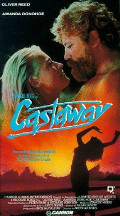
Directed by
Nicolas Roeg
117 minutes
Rated MA
Reviewed by
Bernard Hemingway

Castaway
Castaway, a real life story which was adapted by screenwriter Allan Scott (who had scripted Roeg's Don't Look Now) from Lucy Irvine's “Castaway” and Gerald Kingsland's “The Islander” could have been packaged as a conventional tropical island adventure romance story but it was directed by Nicolas Roeg at the height of his career and thus is an intriguing, if somewhat rough-around-the-edges, film
Irvine (Amanda Donohoe) was an IRS clerk who responded to an advertisement placed by writer Gerald Kingsland (Oliver Reed) in a magazine seeking "a wife for a year on a tropical island". They head off to an island in the Torres Strait but the rigours of survival and two people with little in common in close quarters soon tarnishes the experience particularly when Lucy refuses to “put out’ for Gerald.
Roeg spends the first 30 minutes setting-up the story albeit in a very elliptical and at times obscure way. Gerald appears to have some kind of book deal but how Irvine gets involved is far from clear. There is an odd section in which some woman, who I think is the photographer on the island initially, picks up a Time Out with Gerald’s advertisement and presumably passes it onto Lucy. So was Gerald set up? I am not sure. Most of the time is spent on characterizing Gerald as a charming and classically eccentric Englishman but Lucy has no back-story to speak of.
When the island adventure proper starts the film really hits paydirt with its two principal drawcards of Donahue’s wonderfully unself-conscious, largely naked presence (one can only wonder why Roeg’s wife at the time and regular star, Theresa Russell, did not take the part) and Reed’s gruffly sarcastic yet tender performance. Formally the film, with its reference to Nature to suggest or invoke unspoken human passions and broadly speaking the estrangement between Man and Nature, even in such an apparently idyllic setting, recalls Roeg’s classic Walkabout.
Even here though there are problems of coherence with Lucy almost immediately rebuffing Gerald. The antagonism between the two as they juggle their raw/cooked experiences provides the most rewarding aspects of the film but it feels odd that there is so little in the way of transitioning from the initial set-up to the new dynamics.
Co-laterally the film also shifts abruptly in the latter stage after Lucy and Gerald are saved from starvation (signalled by some clumsy inserts of their shrunken bellies) by nearby islanders. When we cut from this the pair have a kind of Gilligan’s Island set-up complete with a machine shop, a symbol of the end of the back-to-nature adventure and, effectively, of Lucy and Gerald's relationship. At least this time we understand that this was all provided by the islanders but as in reality it would have taken a considerable amount to time to assemble, time which would have been integral to the development of the pair’s relationship, simply cutting from one state to another feels like a short-changing.
Despite its shortcomings Castaway is robustly entertaining enough and thematically provocative enough to warrant the time spent with it.
FYI: Interested parties might like to compare this film with Lina Wertmüller’s 1974 take on a man and a woman alone on a desert island, Swept Away.
Want something different?





